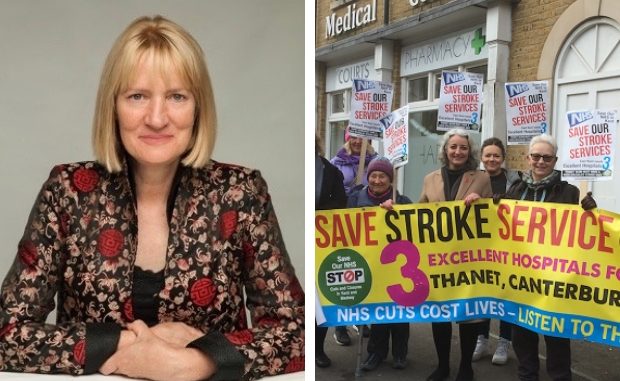
A doctor and NHS campaigner is calling on her colleagues to vote against plans to close emergency stroke units, including the one at Margate’s QEQM Hospital, in favour of three hyper-acute bases for the region.
Dr Coral Jones, who is a GP and an active member of the Save Our NHS in Kent campaign, has spoken out as the stroke decision announcement becomes imminent.
The NHS in Kent and Medway – which includes all 8 Clinical Commissioning Groups – Bexley in south east London and the High Weald area of East Sussex, has plans for three hyper-acute stroke units in Kent and Medway with services earmarked to be provided at William Harvey Hospital in Ashford for all east Kent patients.
An announcement is expected this month following a meeting of the Joint Health Overview and Scrutiny Committee, made up of the clinical commissioning groups. The stroke review will present the final business case to the committee. A date will then be set for the Joint Committee of Clinical Commissioning Groups and a final decision made.
The NHS says hyper acute stroke units will reduce deaths as each will have a multi-disciplinary team of specialist stroke clinicians, seven days a week caring for patients in the critical first 72 hours.
As part of the review, health professionals in Kent and Medway say they are now designing new stroke rehabilitation services, including local hubs.

But Dr Jones says a paper authored last year by Professor Pervinder Bhogal at St Bartholomew’s Hospital, London, brings to light evidence that must be considered before a decision is made.
Dr Jones says the contents of the paper are adequate to halt the stroke plans as it is made clear that the debate about journey time versus being treated in a specialist centre is still unresolved, with local treatment being recommended in the interim.
She said: “The study says that if the additional journey to a specialist centre is longer than 15-20 minutes, local care to stabilise the patient is a better course of action.”
Thanet stroke patients will face a one hour journey by ambulance to Ashford under the new plans. SONiK says most isle residents could reach the existing unit at QEQM by ambulance in 5-20 minutes. They say plans should include a fourth hyper-acute unit to be based at QEQM.
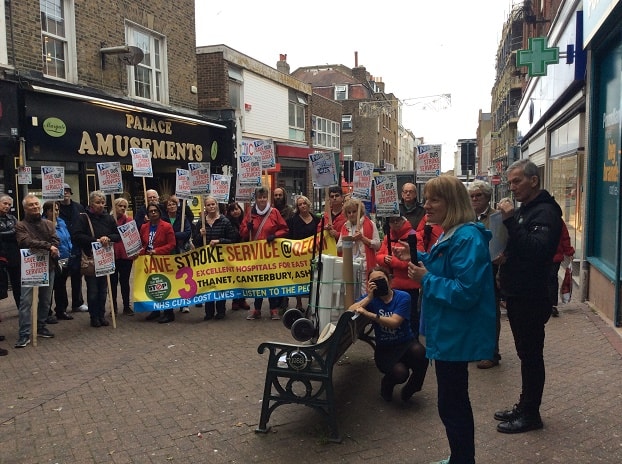
Dr Jones said “Our MPs and decision makers need to wake up. The decision to cut stroke units in Kent is not justified by evidence; in fact it flies in the face of the best evidence available.”
She is calling on all of the GPs on the committee that will be signing off the decision at the end of this month to vote against the plans. She said: “These GPs hold the lives of Kent residents in their hands. I hope they will make the right decision, despite the pressure on them from NHS managers.”
Letter
In a letter to GPs and the isle MPs Dr Jones writes: “The Bhogal paper and the NHS document highlight the lack of evidence supporting delay in primary treatment of stroke which will result from the closure of the stroke unit in Margate.
“The decision to close the Margate stroke service, which offers the recommended facilities of a Primary Stroke Centre of clinical assessment, CT scan and thrombolysis, is premature when plans for thrombectomy centres are being developed, and the results of the Barcelona RACECAT trial are not yet known.”
Thrombolysis is the treatment of a stroke with clot-busting drugs. Thrombectomy is the physical removal of a blood clot in the brain. Thrombolysis is administered in all of the six Kent hospitals that currently have acute stroke units, whereas thrombectomy is not.
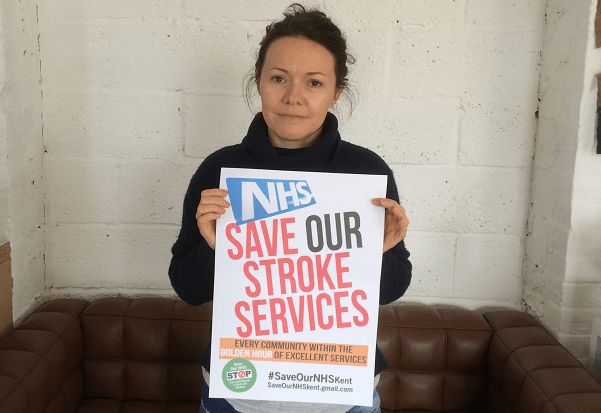
Save our NHS in Kent spokesperson Carly Jeffrey added: “We have been writing to councillors and the GPs who have a vote on the committee in recent months, providing details of all the flaws in the Stroke Review plan. If they do not take all of these factors into account it will be a serious breach of their responsibilities.
“If the GPs vote to approve the stroke plans, then we can call on KCC and Medway councillors to refer the plan back to government, and that is what we will be doing.”
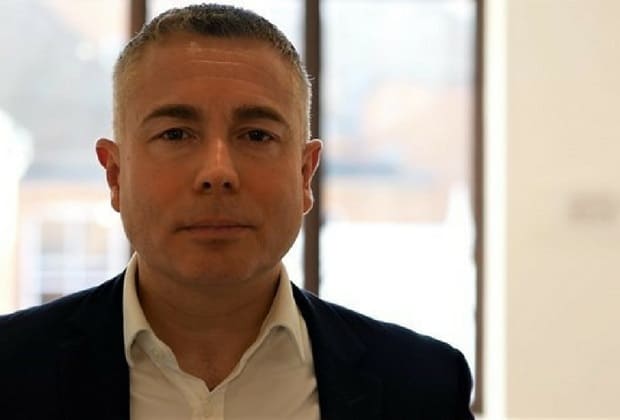
Commenting on Professor Bhogal’s paper, Dr David Hargroves, Senior Stroke Consultant for Queen Elizabeth and the Queen Mother Hospital and William Harvey Hospital, said: “Professor Bhogal is an interventional neuro radiologist. The paper he co-authored highlights the absolute need for suitable stroke patients to receive thrombectomy (manual removal of blood clots in the brain) in a timely manner.
“We wholeheartedly support this and, while we don’t provide this very specialist service anywhere in Kent and Medway now, it is part of our longer term vision to provide thrombectomy in Kent and Medway in the future. The paper discusses the transfer of patients who are suitable for thrombectomy from stroke units to very specialist comprehensive stroke centres which can carry out the procedure. This is very different to the type of service Dr Jones is calling for, where she has suggested patients should be given clot busting drugs in A&E, and then transported to a hyper acute stroke unit. This approach is not suggested nor supported by the evidence in this paper.
“We are proposing to establish three hyper acute stroke units, or ‘HASUs’, at Darent Valley, Maidstone and William Harvey hospitals with one of these equipped to deliver thrombectomy in the future. These units will improve stroke care and outcomes for people, and we believe we will save an additional life every fortnight as a result.”
Carly Jeffrey disputed Dr Hargroves comments, saying: “Dr Coral Jones and SONiK are suggesting that Kent needs at least 4 HASUs with one located at QEQM. We are not suggesting that clot-busting drugs be administered in A&E. Dr Hargroves is missing the point of Dr Jones’ letter, which is that patients with severe strokes need to be stabilised within a reasonable amount of time, and that current thinking does not back up the stroke plans for Kent.”
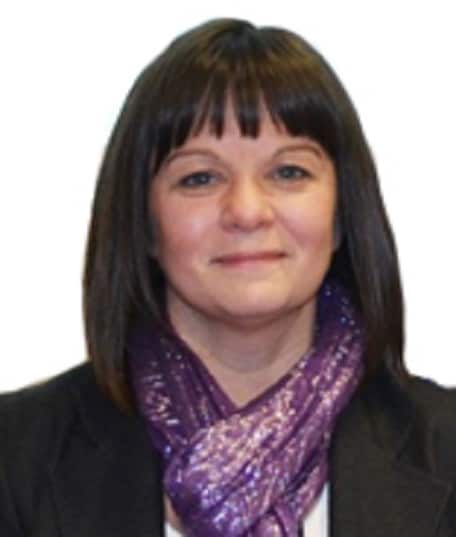
Rachel Jones (pictured), Senior Responsible Officer for the Kent and Medway Stroke Review, said: “While I know Dr Jones is not a Kent GP but is based in London, I am surprised that any doctor would argue to maintain the below-par service currently provided to people in Kent and Medway.
“Despite the tireless hard work and commitment of our staff, at the moment our local stroke services are rated as some of the poorest in the country. This is wholly unacceptable and has to change. On average, 50 per cent of our stroke patients are not currently getting clot busting drugs within an hour of arriving at hospital and, in some places, as many as 83 per cent of stroke patients are waiting over an hour.
“This is mainly because we only have a third of the stroke consultants we need to deliver best care, and aren’t able to consistently provide specialist stroke teams to meet stroke patients directly as they get to hospital. Our proposals would see stroke services in Kent and Medway changing for the better. Combining our staff and resources into three hyper acute units, able to run 24 hours a day, seven days a week, will allow us to deliver excellent care to stroke patients.”
Protest
Save Our NHS in Kent are organising members of the public to attend a public meeting of health committee councillors held at County Hall on Friday, January 25 at 9.30am.
If people want to attend but can’t afford the train fare to Maidstone, contact SONiK which will try and subsidise some costs. Those who are interested should email [email protected]

